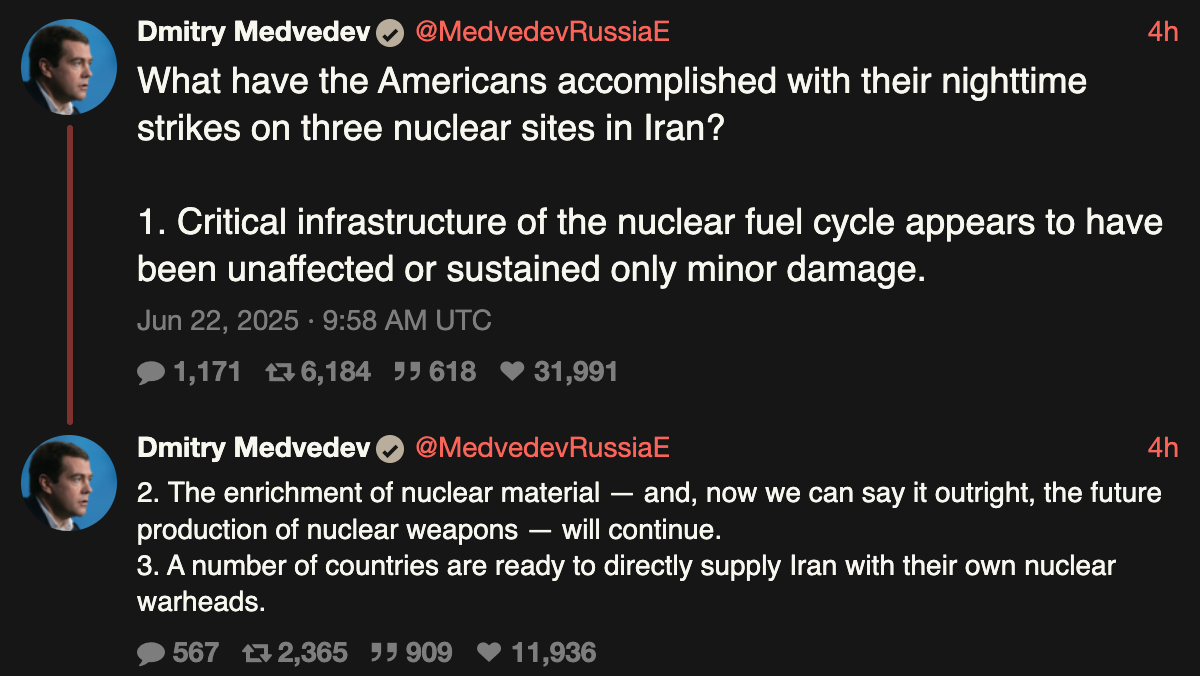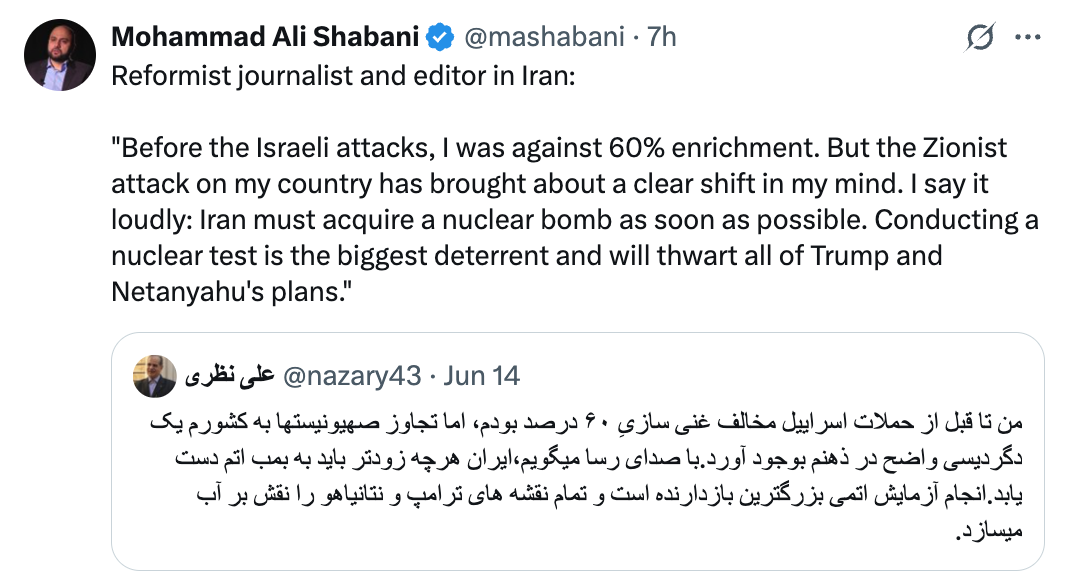This question is based on this post by Peter Wildeford, in which he outlines five possible outcomes of the Israel-Iran conflict by the end of 2025. Scroll down to see descriptions of the five scenarios, or click through to the post for more details.
Most likely, I will resolve this question to whichever of the five scenarios below comes closest to describing my sense of the conflict at the end of 2025.
If it feels to me like the actual thing that happens is equally similar to two of the scenarios below, then I may resolve two of the scenarios to 50/50 (and similarly if it feels equidistant from three of the scenarios, etc.). However, I will try to avoid this; I estimate a 75-80% chance that I will resolve this question 100% to one of the choices.
This is obviously subjective, so I will try to answer questions in the comments, so that market participants aren't blindsided by my eventual resolution.
Scenario 1: Deal by EOY2025 (25% probability)
Key elements:
Trump pushes through a deal allowing limited enrichment at Fordow under monitoring
Iran accepts caps at 20% enrichment with enhanced IAEA inspections, destroying their 60% enriched stockpile
Israel grudgingly accepts US security guarantees and enhanced defense cooperation
Europe holds back on snapback in exchange for Iranian concessions
Sanctions relief from the US is phased in over 2-3 years tied to compliance milestones
Scenario 2: Iran gets nuke by EOY2025 (10% probability)
Key elements:
European snapback triggers Iranian NPT withdrawal
Iran sprints to 90% enrichment using new IR-6 centrifuges at Fordow
First Iranian nuclear device assembled within 60 days
Israel launches desperate strikes including possible tactical nuclear use
US forced to choose between accepting nuclear Iran or direct military intervention
Regional nuclear cascade with Saudi program accelerating
Scenario 3: Large-scale war by EOY2025 (35% probability)
Key elements:
Israeli strikes expand to infrastructure targets across Iran
Iran activates Hezbollah's 50,000+ rockets and attempts Hormuz closure
US drawn in to protect Gulf shipping and US military bases
European forces deploy to secure energy supplies
Conflict potentially spreads to Iraq, Syria, and Lebanon
Potential global recession triggered by $150+ oil prices
Scenario 4: Managed Escalation - The New Normal (23% probability)
Key elements:
No deal reached but no war either
Israel conducts strikes every 3-4 months to “mow the grass”
Iran enriches steadily but strategically stays below 90%
Iran orders calibrated proxy attacks that avoid triggering full war
US and Europe provide just enough support to prevent collapse
Economic warfare continues with sanctions and sabotage
Scenario 5: Iran voluntarily gives up its nuclear ambitions by EOY2025 (7% probability)
Key elements:
Iran voluntarily gives up its nuclear ambitions, likely through regime change within Iran due to Khamenei dying or getting overthrown but possibly due to bowing to overwhelming pressure
No deal is necessary as Iran is no longer pursuing nuclear weapons, even at threshold status.
Iran potentially re-enters the international order
Iran potentially trades complete nuclear dismantlement for massive sanctions relief and security guarantees
Update 2025-06-14 (PST) (AI summary of creator comment): The creator has stated that the resolution will be judged primarily on the level of conflict (i.e., "how 'at war' Israel and Iran end up being").
Specific events, such as the destruction of the Fordow facility, are considered orthogonal to this and not the main deciding factor.
Update 2025-06-23 (PST) (AI summary of creator comment): The creator is proposing to change the resolution criteria from a subjective assessment to a more objective, hierarchical system. The proposed criteria are as follows:
Scenario 2 resolves if there is credible evidence during 2025 that Iran has tested a nuclear weapon or achieved full nuclear weaponization.
Otherwise, Scenario 3 resolves if:
Iran closes the Strait of Hormuz for more than a day, OR
The Iran-Israel war has over 5000 direct military fatalities (all countries) since the beginning of June, OR
Foreign combat troops enter Iran.
Otherwise, Scenario 1 resolves if the US and Iran sign a deal in 2025 that limits the Iranian nuclear program.
Otherwise, Scenario 5 resolves if credible evidence suggests Iran has ceased enrichment for 30+ consecutive days in 2025.
Otherwise, the market resolves to Scenario 4.
Update 2025-08-02 (PST) (AI summary of creator comment): In response to feedback on the proposed new resolution criteria, the creator has clarified the following:
For Scenario 5 to resolve YES, a halt in enrichment due to the destruction of facilities is not sufficient if Iran still has the ambition to rebuild and resume enrichment.
The creator also indicated probable agreement with adding more specific qualifications to the Scenario 3 criterion regarding "foreign combat troops entering Iran".
I am considering changing the resolution criteria to the following (more clear) resolution criteria provided by Peter Wildeford in his latest post on the conflict:
If there is credible evidence during 2025 that Iran has tested a nuclear weapon or otherwise achieved full nuclear weaponization, this resolves Scenario 2 regardless of what else happens.
Otherwise, if one of the following happens: (a) Iran closes the strait of Hormuz for more than a day and/or (b) the Iran-Israel war has over 5000 direct military fatalities from all countries since the beginning of June and/or (c) combat troops from a foreign nation enter Iran, then this resolves Scenario 3.
Otherwise, if 2025 ends with Iran and the US having signed a deal that limits the Iranian nuclear program in any way, this resolves Scenario 1 regardless of what else happens.
Otherwise, if credible evidence suggests Iran has ceased enrichment for 30+ consecutive days starting at some point during 2025, then this resolves Scenario 5 regardless of what else happens.
Otherwise (if all of the above fail to occur), this resolves Scenario 4.
How would people feel about this change? Please like this post (to indicate approval) or leave a comment if you don't like it!
@EricNeyman Seems reasonable, though a few things:
I don't think Scenario 4 should be the backstop — I think it would be better to resolve it according to your judgement if none of the previous criteria are met (potentially resolving to percentages). For instance, if there's regime change, an end to Israeli strikes on Iran, but no credible evidence that they've ceased enrichment, then it would be strange to resolve to Scenario 4.
I also think 'credible evidence that they've ceased enrichment' might be too high of a bar for ruling out scenario 5 as the best description of some possible final outcomes (Iran's nuclear facilities mostly but not completely destroyed, no deal reached or even deemed necessary, reduced level of conflict).
'Foreign combat troops entering Iran' would be best with further qualification, e.g. 'significant numbers of foreign combat troops entering Iran and engaging in the conflict'
@finn You say: "For instance, if there's regime change, an end to Israeli strikes on Iran, but no credible evidence that they've ceased enrichment, then it would be strange to resolve to Scenario 4." How would you resolve it in this specific case?
Regarding Scenario 5: I'm kind of confused about what should happen if we think they're not actively enriching uranium because the facilities have been destroyed, but they have an ambition to rebuild the facilities and start enriching uranium (so they haven't given up). I think in that case I would not resolve Scenario 5 to YES?
I probably agree with your other comments, though.
@FergusArgyll Why would an unresolvable framework on Manifold Markets be evidence that Superforecasters aren't real?
@finn Well, you'll have to wait till I write it :) but it's worth pointing out, this isn't unresolvable because of some market peculiarities, it (might be) unresolvable because it was completely the wrong way to think about the situation and didn't even consider the possibility of a US strike which destroys fordow (the "paradox" is resolved) but we still get a deal afterwards without a large scale war etc.
Like, fundamentally there was no fordow paradox. Fordow was destroyed and yet some of the options are still up in the air, some were never.
@FergusArgyll I'd argue that the possibility of a US strike destroying Fordow is definitely considered, as it's a key part of Peter's definition of the Fordow paradox:
The US possesses the military capability to destroy Fordow but lacks the political will, while Israel has the will but not the capability.
I don't get the impression Peter believed there was no chance this paradox would go unresolved in 2025, but maybe I'm being overly generous.
I agree that the scenarios aren't ideal, but that's exactly why I think it's cool that we can spin up a market that can be resolved subjectively. I liked Peter's article because it contained helpful background research and enumerated the key moving parts, but the scenarios (and their respective probabilities) didn't seem right to me. I bet on 'deal' and 'Iran voluntarily gives up its nuclear ambitions' because those outcomes seemed to best capture how I saw this unfolding, even if I thought neither would be realised exactly as described.
Things to consider:
Peter published this article ~24h after Israel's surprise attack on Iran, and wasn't trying to create a resolvable framework with it.
Peter deciding to frame things as mutually exclusive, colourfully-described scenarios are not typical in Tetlock-style judgemental forecasting. The typical professional forecasting process emphasises resolvability more, and leans strongly on aggregating (and, ideally, teaming up) strong forecasters; but it's very difficult producing that sort of thing to a high quality in 24h. As an example, we started working on this a couple of days after the Oct 7 attacks, but it still took a few days to determine the questions, gather the forecasts and rationales, and write up the article: https://www.swiftcentre.org/publicforecasts/israel-hamas-war-will-probably-be-the-deadliest-of-the-last-75-years-of-conflict.
I think Peter's public track record is based on his performance in ACX annual contests; I don't think he's a certified Good Judgement Superforecaster™. I don't think this actually matters much, but this market has little relation to capital S "Superforecasters", so you should probably use a different term.
The article and this market all seem helpful for surfacing useful information for people — I think it's better that they were created (and created quickly as the situation was unfolding). Before, forecasting questions (and forecasts on them) were published very slowly (e.g. on GJOpen) and that slowness massively reduces the value proposition of forecasting (even if resolvability is higher).
I think forecasting and superforecasters are very valuable. Obviously he won a lot of medals on metaculus etc. & I would bet on him and others like him continuing to do so (i.e. continuing to outperform).
"Superforecasters aren't real" is a "too online" way of communicating a subtle point that I never explained - so whatever you imagine the point to be, it's probably wrong. I want to emphasize, I don't actually mean they aren't real!
As for the actual post: My problem with it is not that it's not resolvable, though that too is an issue. My problem with it is it seems (yes, retrospect, 20 / 20 etc etc) Fordow was not the crux, the strategic constraint which would determine the direction this goes. I don't think it was the correct lens through which to view the conflict.
can someone help me understand the logic here? why do people think a deal is so likely? israel bombs the shit out of iran, and now the usa too, killing many and destroying lots beyond just potential weapons facilities... and people think this will help lead to a new deal? is the angle that iran will be beaten so hard they will be forced into submission basically? i view all of this as making them LESS likely to agree to any kind of deal, not more
@No_uh context: before my comment this had been hovering around 25-30% for days. Until the reporting of the us strikes became wide. even at time of my comment (probably 20 minutes after the news broke) it was still 29% lol
@No_uh Im personally surprised people are so confident Iran won't get a nuke. I mean, now they have no reason not to
@nathanwei dunno. I'm not a military person nor nuclear scientist, but I think an Iran that views "get a nuke" as an exit strategy is a lot more likely to get one!
@copiumarc i think given what we've seen the past few days if they legitimately tried theyd get absolutely bombed the shit out of
@nathanwei It's not about making, it's about getting. Here's the Deputy Chair of the Security Council of the Russian Federation:

source: https://x.com/MedvedevRussiaE/status/1936725544017567860
@No_uh the head of their military was killed and then a few days later the new head of their military was killed. A deal is their only option not to die
@AlexanderTheGreater i think they very well can just... not do much of anything but be a pain at the negotiating table like they did pre 2025 since like 2018 can't they?
Bet on whether Israel will be able to crack Iran’s toughest nut, the Fordow nuclear site:
https://manifold.markets/bens/will-fordow-be-put-out-of-commissio?r=YmVucw
@max Yeah, I think I agree that whether Israel destroys Fordow is probably orthogonal to which of these scenarios comes to pass, and I'll mostly be judging based on how "at war" Israel and Iran end up being, or something like that.

